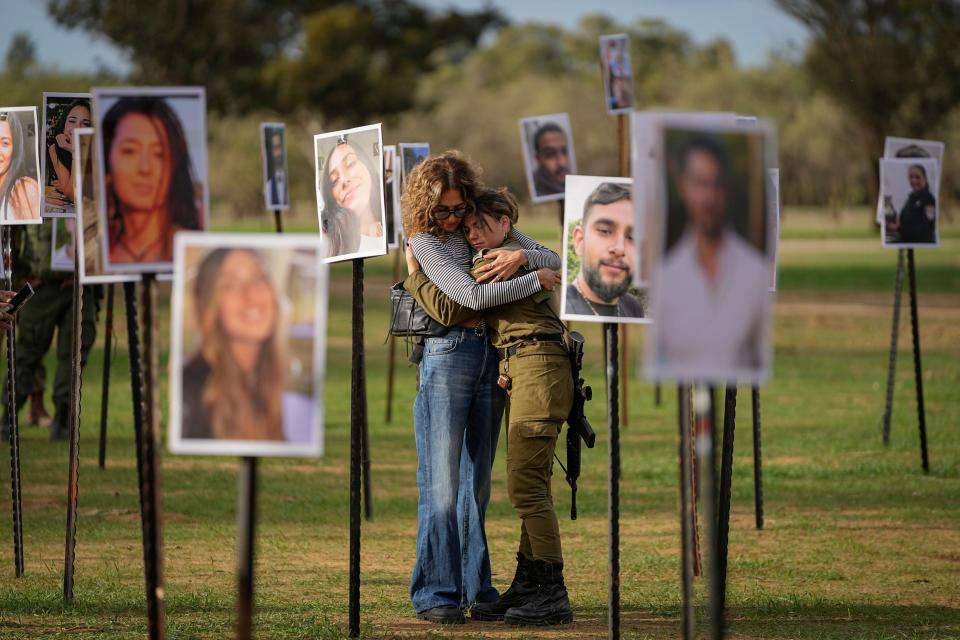Opinion: I lived through a massacre. Some of my classmates say it never happened
I lived through a massacre that never happened.
At least, that’s what many of my classmates have said.
Five days after I arrived in Israel for a law school exchange program between the University of Texas and Tel Aviv University, thousands of Hamas militants breached Israel’s security barrier, killing around 1,200 Israelis and seizing over 240 hostages.
On the morning of October 7th, I was awakened by the sound of sirens and explosions. Before I could process what was happening, I received a frantic phone call from a friend.“There are gunshots, we have to get out of here!”

The Nova music festival was the first place Hamas attacked, killing nearly 400 attendees. A friend of mine fled the scene in a car. Militants waited on the roadside, opening fire on vehicles passing by. My friend was shot in the leg through the car door.
I was miles away, huddled in a bomb shelter with dozens of others while Hamas militants made their way through Israeli towns. Rockets rained down on us for hours. When the explosions subsided, we cautiously emerged and observed fires nearby.
I saw the aftermath with my own eyes. Cars were burnt to a crisp by Hamas to prevent people from fleeing. Porta-potties bore bullet holes from militants shooting at Israelis seeking refuge inside. Homes were reduced to rubble.
It was the site of a massacre.
Little did I know that less than a week later, my own classmates would deny it.
First came the justifications. That very same day, my childhood friend posted on Instagram that, although Hamas’ actions were bad, they had to be contextualized. The massacre was understandable given Israel’s treatment of Palestinians. And I shouldn’t be complaining; a classmate reminded me that I was privileged to be in a bomb shelter.
Then, the celebrations. The next day, thousands took to the streets to celebrate Hamas’ glorious achievement. Flyers were passed around UT law school, calling on students to stand in solidarity with those who support Hamas’ resistance.
And finally, the denial. Those who had celebrated the attacks a week earlier were now denying they ever happened. Photos of hostages were labeled as false propaganda and torn down across college campuses. A letter from the UT Jewish Legal Society expressing grief over October 7th was removed and replaced with flyers promoting a rally for Palestine. The faculty was sympathetic to our concerns and made efforts to address the issue, but students persisted in their denial.
I was stunned when a fellow law student suggested that the hundreds murdered at the Nova festival were actually killed by the IDF. How could someone so intelligent deny a massacre that Hamas themselves livestreamed? One haunting video shows militants parading the body of a young Israeli woman stripped to her underwear through the streets of Gaza. The woman had been at the Nova festival. Did my classmate believe the IDF killed a woman, and Hamas, for no apparent reason, paraded her body through Gaza as if they were responsible?
Frustrated, I watched people half a world away deny the reality that I was still living in, as daily rocket barrages continued. Classmates praised Hamas’ treatment of the hostages, only to later reject testimonies of abuse from the hostages themselves. Those who championed the “believe women” movement made an exception for Israeli women.
When I returned to Texas months later, two young women asked me how I knew that my friend was shot by Hamas and not the IDF. I told them my friend is still alive; he survived to tell the tale. They shook their heads.
“Hamas didn’t shoot your friend,” they told me. “The IDF did.”
In that moment, I knew any effort to engage further was futile. The hundreds of firsthand accounts from survivors didn’t convince them, nor did Hamas’ own videos of the attacks. How could I possibly convince them?
Apparently, I lived through a massacre that never happened.
Maher is a law student at the University of Texas.
This article originally appeared on Austin American-Statesman: Opinion: I lived through a massacre. Even some of my classmates say it never happened.

